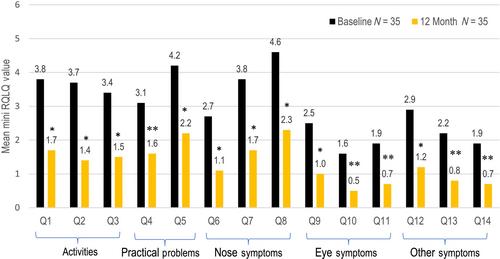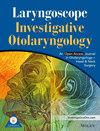Long-term outcomes following impedance-controlled radiofrequency ablation for the treatment of chronic rhinitis
Abstract
Objective
To assess long-term safety and effectiveness of a multipoint, impedance-controlled, RF ablation device for treatment of chronic rhinitis through 12-month follow-up.
Methods
A prospective, multicenter study. Bilateral posterior nasal nerve (PNN) ablation was performed on all participants. Assessments at 6-, 9-, and 12-month visits included Visual Analog Scale Nasal Symptom Score (VAS NSS), reflective Total Nasal Symptom Score (rTNSS), mini-Rhinoconjunctivitis Quality of Life Questionnaire (mini RQLQ), and adverse events.
Results
Thirty-six participants were enrolled and 35 completed the 12-month follow-up. All 5 VAS NSS items demonstrated statistically significant improvement (p < .0001) over baseline at all 3 time points. The total rTNSS improved from 7.9 ± 1.8 at baseline to 4.3 ± 2.1 at 6-months, 3.8 ± 2.4 at 9-months, and 4.0 ± 2.1 at 12-months (all p < .0001). At 12-months, 91% (31/35) of participants had achieved the minimum clinically important difference (MCID) of a reduction from baseline of ≥1 point and 80% (28/35) of the participants met the responder criteria of ≥30% reduction from baseline. The total mean mini RQLQ was reduced from 3.0 ± 1.0 at baseline to 1.4 ± 0.8 at 6-months, 1.4 ± 1.0 at 9-months, and 1.3 ± 0.8 at 12-months (all p < .0001). At 12-months, 86% (30/35) of participants achieved the MCID of a reduction from baseline of ≥0.4 points for the mini RQLQ. No related serious adverse events occurred during the study.
Conclusions
Impedance-controlled RF ablation of the PNN is safe and resulted in durable, significant improvement in rhinitis symptoms and quality of life through 12-month follow-up.
Trial Registration
The study is registered at www.clinicaltrials.gov with the unique identifier of NCT05324397.
Level of Evidence
4.


 求助内容:
求助内容: 应助结果提醒方式:
应助结果提醒方式:


